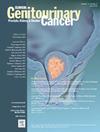Causal Associations Between the Presence of Prostate Cancer or Testosterone Levels and Bladder Cancer Risk: A Mendelian Randomization Study
IF 2.7
3区 医学
Q3 ONCOLOGY
引用次数: 0
Abstract
Background
Previous observational studies and meta-analyses have indicated that prostate cancer and testosterone levels could be potential risk factors for bladder cancer. However, these studies are vulnerable to confounding variables and reverse causality. Thus, we conducted a 2-sample Mendelian Randomization (MR) study to elucidate the causal link between the presence of prostate cancer or testosterone levels and bladder cancer.
Methods
We acquired summary statistics for the presence of prostate cancer or testosterone levels and bladder cancer from genome-wide association studies (GWAS). MR analysis was employed to investigate the potential causal relationship between the presence of prostate cancer or testosterone levels and bladder cancer. The primary method employed was the inverse variance weighted (IVW) method, with results rigorously assessed through sensitivity analysis.
Results
IVW Mendelian randomization results demonstrated that prostate cancer was causally associated with an elevated risk of bladder cancer in FinnGen (OR 1.22, 95% CI, 1.13-1.31, P < .001), UK Biobank (OR 17.9, 95% CI, 3.28-97.62, P < .001), and the PRACTICAL database (OR 1.13, 95% CI, 1.05-1.22, P < .001). There was no evidence of heterogeneity in the effects of genetic factors on bladder cancer risk, as indicated by Cochran's Q statistical test (FinnGen Q = 68.86, P = .13; UK Biobank Q = 29.05, P = .61; PRACTICAL Q = 108.88, P = .48). Sensitivity analyses confirmed the stability and robustness of the genetically determined risk effect of prostate cancer on bladder cancer. However, there was no causal link between testosterone levels and bladder cancer (P > .05).
Conclusions
This study identified that genetically predicted prostate cancer was causally linked to an increased risk of bladder cancer. Appropriate measures should be taken to prevent the subsequent development of bladder cancer in patients with prostate cancer.
前列腺癌或睾酮水平与膀胱癌风险之间的因果关系:孟德尔随机研究
先前的观察性研究和荟萃分析表明,前列腺癌和睾丸激素水平可能是膀胱癌的潜在危险因素。然而,这些研究容易受到混杂变量和反向因果关系的影响。因此,我们进行了一项两样本孟德尔随机化(MR)研究,以阐明前列腺癌或睾丸激素水平与膀胱癌之间的因果关系。方法我们从全基因组关联研究(GWAS)中获得前列腺癌或睾酮水平与膀胱癌存在的汇总统计数据。磁共振分析用于研究前列腺癌或睾丸激素水平与膀胱癌之间的潜在因果关系。采用的主要方法是方差反加权法(IVW),并通过敏感性分析对结果进行严格评估。结果孟德尔随机化结果显示,前列腺癌与芬兰患者膀胱癌风险升高存在因果关系(OR 1.22, 95% CI, 1.13-1.31, P <;.001), UK Biobank (OR 17.9, 95% CI, 3.28-97.62, P <;.001)和PRACTICAL数据库(OR 1.13, 95% CI, 1.05-1.22, P <;措施)。Cochran’s Q统计检验(FinnGen Q = 68.86, P = 0.13;UK Biobank Q = 29.05, P = 0.61;实用q = 108.88, p = 0.48)。敏感性分析证实了前列腺癌对膀胱癌的遗传决定风险效应的稳定性和稳健性。然而,睾酮水平与膀胱癌之间没有因果关系(P >;. 05)。结论:这项研究发现,基因预测前列腺癌与膀胱癌风险增加有因果关系。应采取适当措施,防止前列腺癌患者继发膀胱癌。
本文章由计算机程序翻译,如有差异,请以英文原文为准。
求助全文
约1分钟内获得全文
求助全文
来源期刊

Clinical genitourinary cancer
医学-泌尿学与肾脏学
CiteScore
5.20
自引率
6.20%
发文量
201
审稿时长
54 days
期刊介绍:
Clinical Genitourinary Cancer is a peer-reviewed journal that publishes original articles describing various aspects of clinical and translational research in genitourinary cancers. Clinical Genitourinary Cancer is devoted to articles on detection, diagnosis, prevention, and treatment of genitourinary cancers. The main emphasis is on recent scientific developments in all areas related to genitourinary malignancies. Specific areas of interest include clinical research and mechanistic approaches; drug sensitivity and resistance; gene and antisense therapy; pathology, markers, and prognostic indicators; chemoprevention strategies; multimodality therapy; and integration of various approaches.
 求助内容:
求助内容: 应助结果提醒方式:
应助结果提醒方式:


